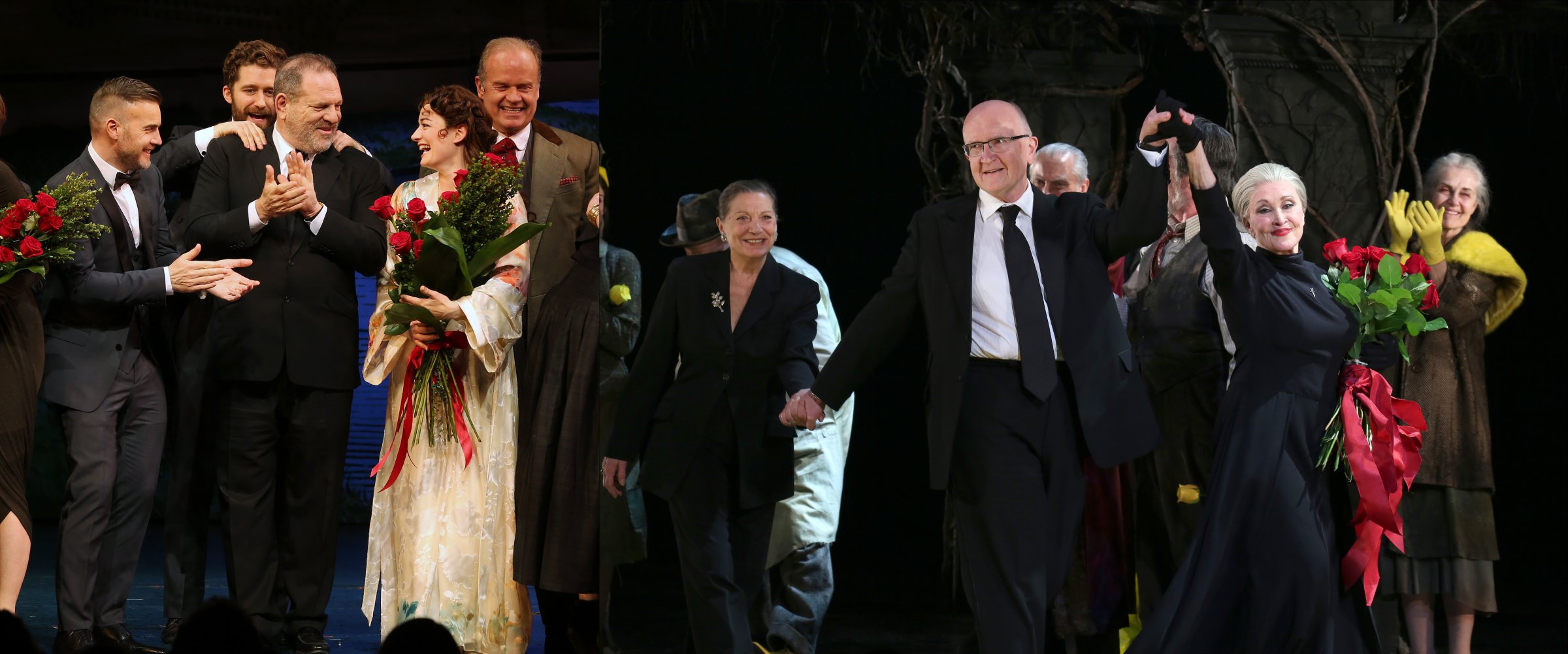
The troubled history of Finding Neverland, the new Broadway musical about author J.M. Barrie and the writing of Peter Pan, is one of those juicy backstage stories that theater insiders love. Producer Harvey Weinstein, the independent film mogul overseeing his first Broadway musical, scrapped one earlier version of the show, replaced the entire creative team, complained about the critics and fought with his own publicists — all before the show finally opened on Broadway two weeks ago.
But is it possible to ignore the backstage soap opera and actually look at what’s onstage? Audiences apparently can, since they’ve been flocking to the show in near sellout numbers. As for the critics? Not so much. The mostly negative reviews seem to be more a judgment on Weinstein and his shenanigans than on the musical itself. Because what I saw onstage, at Broadway’s Lunt-Fontane Theater, is a surprisingly enjoyable show.
To appreciate the sheer craft involved in pulling it off, you need to compare it to the rather treacly, Oscar-nominated 2004 movie on which it’s based. Rare for one of these screen-to-stage transfers, the musical improves on the movie in almost every way. Matthew Morrison, recently of the TV show Glee, is more convincing and relatable as Barrie than the moony and mercurial Johnny Depp in the film. Kelsey Grammer has a firmer fix on the character of Barrie’s gruff producer (and better comic timing) than Dustin Hoffman. The stage version is less saccharine and less dragged out; we’re spared all those endless shots of Kate Winslet gazing beatifically at Barrie and her boys, whose game-playing supposedly inspired him to create the famous children’s story. It strikes me as the very model of a modern family musical: briskly told, brightly staged, with a score (by British rocker Gary Barlow) as tuneful as one could expect from a show set in turn-of-the-century London that’s not by Gilbert and Sullivan.
Much credit goes to James Graham’s script, which is witty, efficient and mostly dry-eyed. Director Diane Paulus’s staging is slick and inventive, but never over the top. As Barrie watches the boys bounce on a bed, they are borne aloft by stagehands in dreamy slow-motion (no tacky wires here). A stuffy dinner party, attended by Barrie and the boys, suddenly breaks into a spirited fantasy interlude, a production number that captures the kid-at-heart awakening of Barrie better than anything in the movie. Mia Michaels’ choreography avoids traditional Broadway chorus lines, acrobatics and ballet pretensions for clever, tightly synchronized, character-driven group movement, and it is winning.
Yes, the story still inspires some qualms (a brief bit of dialogue raises intimations of pedophilia), and there’s some heavy-handed comedy business involving the huffy stage actors who are forced to play kids and dogs in Barrie’s new children’s play. (Plus one offhand, out-of-character reference to Grammer’s old TV series Cheers that has been treated by the guardians of Broadway purity as if it were grounds for federal prosecution.) But these are trivial flaws in a show that displays a lot of poise and professionalism, and deserves a long run.
The Visit, a musical version of Friedrich Durrenmatt’s great 1956 play, is another show that arrives on Broadway with plenty of backstage baggage. One of the last collaborations between songwriters John Kander and the late Fred Ebb (Cabaret, Chicago), the show was originally staged in Chicago in 2001, has been tinkered with and restaged several times, and has survived to make its Broadway debut thanks largely to one salutary constant: its star, 82-year-old Broadway legend Chita Rivera.
She plays Clare Zachanassian, the world’s richest woman, who returns to her impoverished home town with a strange retinue: a tuxedoed butler, two blind eunuchs and an empty coffin. She has come back to see the lover (Roger Rees) who once jilted her, and to calmly offer the town a way out of its economic misery: she will pay $10 billion if they will murder him.
Clearly, we are not in Oklahoma! territory here. Durrenmatt’s play is a product of the postwar experimental European theater tradition — an allegorical, anti-realistic style, a touch of absurdism and a bleak, unsentimental view of the human predicament. The play is a parable of greed and revenge and conformity — and perhaps Nazi Germany too. (Durrenmatt was a Swiss who wrote in German.) Though embellished by Kander and Ebb’s sweet, deceptively simple, oom-pah-pah songs, it is the darkest musical I think I have ever seen on Broadway.
But it is a stunner. Terrence McNally’s clear, spare adaptation is almost as good as his musical masterpiece, Ragtime. Director John Doyle has pared down the version I saw in 2008 at Virginia’s Signature Theater, perhaps skimping a bit too much on the town’s evolving reaction to Clare’s shocking proposal. But he gives the show an intensity you rarely see in a Broadway musical. Set in a decrepit railway station, relentlessly gray except for the dabs of yellow as the townspeople begin to eye their possible riches, the show hits a peak in the unsettling anti-production number “Yellow Shoes,” as bright and chilling as a blast of winter ice.
Rivera is commanding as Clare, looking regal (“That’s not beauty,” says one of the townspeople; “that’s money”), her throaty voice still strong, betraying no fragility despite using a cane (the character has an artificial leg, along with other replacement body parts). She deserves the raves she is winning, but that shouldn’t obscure the achievement of this brave, uncompromising slice of Broadway misanthropy.
More Must-Reads from TIME
- Inside Elon Musk’s War on Washington
- Meet the 2025 Women of the Year
- The Harsh Truth About Disability Inclusion
- Why Do More Young Adults Have Cancer?
- Colman Domingo Leads With Radical Love
- How to Get Better at Doing Things Alone
- Cecily Strong on Goober the Clown
- Column: The Rise of America’s Broligarchy
Contact us at letters@time.com